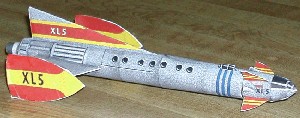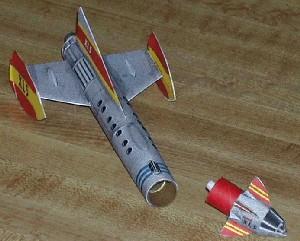| Manufacturer: | Paper |
 Brief:
Brief:
This is a paper model of the Fireball XL-5 that I converted to fly on MicroMaxx motors. The plans come in a .pdf file that you can find here [Editor's note: the link no longer works].
 Construction:
Construction:
- One sheet of white cardstock
- BT-5 tube
- BT-5 coupler
- 6 mm tube
- ¼" piece of a spent MMX casing
- Hand-cut cardstock centering rings
- Section of BiC pen's ink tube
- Lead shot nose weight
- Kevlarcord
The plans and instructions for the XL-5 are contained in a single .pdf file, and are each a single page in length. The instructions are very sparse, providing only one "exploded" view of how the parts fit together and two construction tips. If you have built a paper model or two, they are adequate. There are also a few instructions on the plan itself.
The model is well detailed and many of the trim components are small. However, I found these much easier to work with than the truly minuscule parts on the Currell Airship-100. There are 30 parts to cut out, and I used all but the final wrap on the tail cone, as this is smaller than the diameter of a MMX motor. On this model, I worked on a flat surface with better lighting, which helped a great deal. All cuts were made with a sharp Exacto knife using a metal straight edge and a rubber pad.
The body consists of two wraps, the nose cone three, and the tail two. I first built the body and found a BT-5 tube fit nicely in the front end, but was loose at the tail end. I then test fit the tail wraps to a MMX-sized plastic tube, and found that the last wrap was too small. I proceeded to install the tail cone. I then slid a BT-5 tube down into the tail cone and cut it to fit. I built the motor mount from a section of 6 mm plastic tube, hand cut centering rings and a chunk of spent MMX casing as a motor block. I tied the Kevlar twine around the motor block before I glued it in. When I installed the motor mount assembly, I left about 1/8" hanging out the back, so the mount would extend through the end of the tail cone. A ring of carpenter's glue around the front end of the body wrap holds the tube into the paper body.
I then built the nose cone, including a section of BT-5 coupler. Getting out of sequence a bit, I added enough lead shot to the nose to position the CG at the same relative point as the CG on my larger Fireball model (3" from the tip of the nose). This shot and the shock cord was affixed with 5-minute epoxy.
I proceeded to glue on the fins and trim pieces, which are all 3-D structures that need to be pre-assembled. About the only point to note is the side, vertical wings are only supported with a cross-member at the back end. As a result, they collapsed in the middle. I recommend that you make some tapered, V-shaped pieces of card stock to support the middle of these fins.
No finishing is required as the hull of the model is pre-printed. I recommend you provide a clear coat to protect the printing. I learned the hard way that Brawny paper towels have nothing on this cardstock! I laid the model on a counter surface that had just been wiped, but still was slightly moist. One vertical back fin and one front fin soaked up the water and the colors ran badly. Luckily, I just had to print some replacements parts :-)
Flight:
Since the rocket is light and grass is soft, I didn't add a streamer. I used my Pratt GO-BOX and the innards of a stock MMX igniter. The flight was a little wobbly in the light gusty winds, but was still nice.
Summary:
This is a cool little paper kit that easily converted to a rocket. If you build one, make sure you give it a clear coat to protect the print.
 |
 |